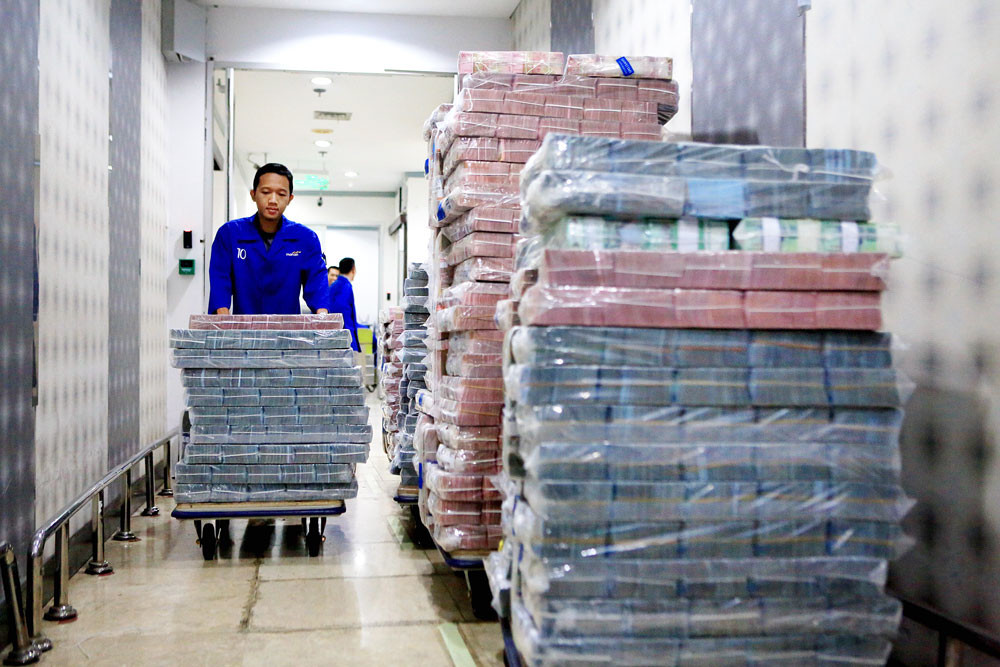Popular Reads
Top Results
Can't find what you're looking for?
View all search resultsPopular Reads
Top Results
Can't find what you're looking for?
View all search resultsBank Mandiri to pay $1.2b dividends, appoints Chatib Basri as top commissioner
The dividends are equal to 60 percent of the company's total profit in 2019 of Rp 27.5 trillion, according to the bank's announcement. They are also significantly higher than last year's figure of Rp 11.2 trillion or equal to 45 percent of the bank's profit in 2018.
Change text size
Gift Premium Articles
to Anyone
I
ndonesia's largest lender by assets, state-owned Bank Mandiri, announced on Wednesday a plan to distribute Rp 16.49 trillion (US$1.2 billion) as dividends to its shareholders and the appointment of former finance minister Chatib Basri as its president commissioner.
The dividends are equal to 60 percent of the company's total profit in 2019 of Rp 27.5 trillion, according to the bank's announcement. They are also significantly higher than last year's figure of Rp 11.2 trillion or equal to 45 percent of the bank's profit in 2018.
Bank Mandiri's shareholders will receive a dividend of Rp 353.34 for each share, an increase of 46.61 percent year-on-year (yoy) from the previous year’s dividend of Rp 241 per share. This means that the government, which holds 28 billion of the bank’s shares, will receive Rp 9.89 trillion of dividends from Bank Mandiri this year.
Bank Mandiri president director Royke Tumilaar said the bank had taken its liquidity needs to develop its business in paying its dividends.
“We’ve also taken into account the regulator’s latest requirement in determining how much we would give to our shareholders,” he said in a press briefing after its annual general shareholders meeting in Jakarta, referring to the new accounting standard PSAK 71.
The remaining 40 percent of the bank’s profit last year, or equal to Rp 11 trillion, would be kept as retained capital.
Bank Mandiri finance director Silvano Rumantir said the bank estimated that retained capital would still be enough to maintain its capital adequacy ratio (CAR) well above 18 percent, despite having to allocate loan loss provision for both good and bad loans as stipulated in the new PSAK 71 early in the financial year.
The publicly listed bank's net profit grew 9.86 percent yoy in 2019, lower than the 21.2 percent expansion recorded the year prior. Bank Mandiri recorded outstanding loans worth Rp 907.5 trillion last year, up 10.65 percent yoy and compared to 12.4 percent growth booked in 2018. Non-performing loans were at the lowest level since 2016 at 2.33 percent.
Other than deciding on the dividends, the company also appointed former finance minister Chatib Basri as its new president commissioner, replacing State-Owned Enterprises (SOEs) Deputy Minister Kartika “Tiko” Wirjoatmodjo who was appointed Bank Rakyat Indonesia (BRI) president commissioner.
The shareholders also appointed former BRI president commissioner Andrinof Chaniago as Bank Mandiri’s vice president commissioner, replacing Chatib who moved up the ladder. Several notable names, such as Indonesian Democratic Party of Struggle (PDI-P) politician Arif Budimanta and the SOEs Ministry’s undersecretary for finance and risk management, Nawal Nely, are also new members of the bank’s board of commissioners.
The shareholders also overhauled the bank’s board of directors, as it promoted Hery Gunadi, who was previously the bank’s business and networking director, to vice president director. They also appointed Aquarius Rudianto, the bank’s head of regional commercial sales I, to fill in Hery’s previous position.
Bank Mandiri is the second state bank to announce hefty dividend payouts this week. Bank Rakyat Indonesia (BRI), the nation’s most profitable lender, announced on Tuesday a plan to distribute Rp 20.6 trillion (US$ 1.5 billion) in dividends to its shareholders. The dividend payout represents 60 percent of the bank's profit, higher than its 50 percent dividend payout ratio in 2018.
Mandiri and BRI, which also saw board of directors and commissioners shakeup, will be followed by state lender Bank Negara Indonesia (BNI), which will hold its annual shareholders meeting with a similar agenda on Thursday.
Shares in Bank Mandiri traded at Rp 7,950 at Wednesday's trading close, 1.6 percent higher than the previous day. The stocks have risen nearly 12 percent in the past year, easily outstripping the broader benchmark Jakarta Composite Index's (JCI) 9.3 percent fall.










